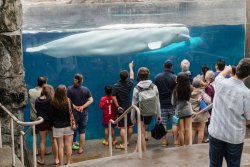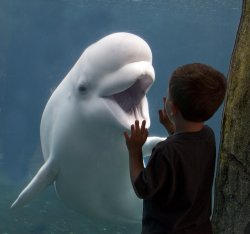Recently there has been a spate of deaths of young whales held in entertainment parks around the world. It seems like every day we hear of another:
- In March of this year, 17-year-old orca Skyla died “suddenly” at Loro Parque zoo in the Canary Islands;
- In July, a newborn beluga passed away at Georgia Aquarium;
- In that same month a second orca at Loro Parque, two-year-old Ula, died after a period of “ill health”;
- In early August, Mystic Aquarium announced the death of a juvenile male beluga who had been transferred from Marineland Canada;
- This past week, Amaya, a six-year-old orca at SeaWorld San Diego died “unexpectedly”;
- And on the heels of the first beluga death, Mystic Aquarium has just announced that another of the very young belugas from Marineland is “seriously ill”.

A beluga whale swims past tourists at Mystic Aquarium. (Photo by Pako Dominguez via Alamy)
In each of these cases, the marine parks and zoos who hold these individuals claim to be surprised and dumbfounded at the losses. SeaWorld said of the death of Amaya in an email to McClatchy News: “Her death was sudden and unexpected.” And, of the death of Skyla, Loro Parque said she was “in perfect condition until yesterday.”
Cetacean health and well-being is seriously compromised in marine parks.But these deaths are no mystery. There is substantial scientific literature on the welfare of captive wild species from birds to mammals. The clinical profiles of different species in zoos and marine parks correlate with their adaptive traits – characteristics that have made them successful as they evolved. The larger the gap between the evolutionarily adaptive characteristics of a species and the captive environment, the lower the welfare. For instance, animal welfare scientists Ros Clubb and Georgia Mason found that carnivores with naturally large home ranges tend to have poorer welfare in zoos than those with small home ranges. These and other findings make it clear why cetacean health and well-being is so seriously compromised in marine parks.

Beluga whale at Mystic Aquarium. Photo by Carol A. Highsmith, Library of Congress.
The evolutionary history of a species shapes its modern nature – those characteristics that need to be expressed in order for members of that species to flourish. Most cetacean species kept in aquariums evolved over tens of millions of years in an ocean environment that affords opportunities for wide-ranging travel, social complexity, and the psychological stimulation of hunting, escaping dangers, and exploring. In the absence of any of these inputs, chronic stress leads to psychological and physical disorders well-documented in the scientific literature for other species. As an example, monkeys confined to impoverished, unstimulating and small environments show more behavioral abnormalities than those in a natural or enriched environment. The parallels with captive cetaceans and free-ranging cetaceans are apparent.
Animal welfare science has a clear message that is being ignored by marine parks and zoos: Square pegs do not fit into round holes.
So, when the entertainment parks claim to be flummoxed over the deaths of young whales, they simply need to pull down the nearest marine mammal biology textbook from the shelf to find out why these deaths are no mystery.